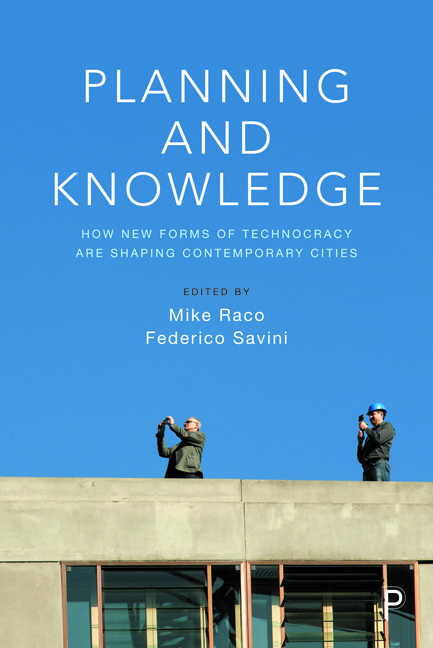Book contents
- Frontmatter
- Contents
- List of figures
- List of tables
- Notes on contributors
- Part I Conceptual framings of technocracy
- Part II Public planning and bureaucracies in contemporary urban development politics
- Part III Corporate knowledge and the land and property development sector
- Part IV Private consultants and the delivery of public policy
- Part V New constellations of actors and the management and governance of contemporary cities
- References
- Index
6 - Captured by bureaucracy: street- levelprofessionals mediating past, present and futureknowledge
Published online by Cambridge University Press: 30 April 2022
- Frontmatter
- Contents
- List of figures
- List of tables
- Notes on contributors
- Part I Conceptual framings of technocracy
- Part II Public planning and bureaucracies in contemporary urban development politics
- Part III Corporate knowledge and the land and property development sector
- Part IV Private consultants and the delivery of public policy
- Part V New constellations of actors and the management and governance of contemporary cities
- References
- Index
Summary
Introduction
This chapter explores the role of ‘street-levelprofessionals’ in planning, a peculiar expertisethat emerges in response to the decreasinglegitimacy and efficacy of public action in urbangovernance processes. In particular, I look at thestreet-level professional in order to question theuneven tension between bureaucratic and tacitknowledge in contemporary participatory processes. Ishow how initiatives that attempt to mediate betweengovernmental and local community ambitions are todaytrapped in existing bureaucratic structures (Scott,1998).
Lipsky's classic study of street-level bureaucrats(1980) reveals how frontline workers are embedded inthe logic of bureaucracy on the one hand and themessy reality of the street-level on the other.Street-level workers are required to translate therational norms of bureaucracy – which are guided byaccountability, quotas and transparency – to thenorms and practices of everyday life at thestreet-level – where they need experience, tacitknowledge and improvisation. In Lipsky's work,street-level bureaucrats are typically teachers,police officers, social workers and court officials(Lipsky, 1980: 3). In this chapter, building on theseminal work by Lipsky, I look at policymakers andplanners who have the responsibility to organise adeliberative or participatory process as street-level professionals, those mediators who are todayfilling the widening gap between retrenched publicgovernments and civic society. I use the term‘professional’ to include the growing body ofexperts who, because of a growing demand forparticipatory planning, are in the unique positionto bridge plans of the local government with plansof the community.
I argue that planners are in a unique position todevelop an expertise for such street-levelmediation. However, existing institutions tend to‘capture’ that mediation through norms that requireorganising, reducing and abstracting the complexknowledge of the community. This entrapping capacityof institutions is, as I argue, a distinctive logicof today's technocratic planning. I will use aninterpretative approach (Yanow, 2000; 2007) toanalyse several ‘critical moments’ that shaped oneparticular planning process in Amsterdam. Thesechallenging moments provide a lens into three waysin which the deliberative process was ‘captured bybureaucracy’: first, by excluding informal storiesfrom the institutional memory; second, by a top-downproblem definition; and third, by the changingmeaning of the decision mandate.
- Type
- Chapter
- Information
- Planning and KnowledgeHow New Forms of Technocracy Are Shaping Contemporary Cities, pp. 75 - 88Publisher: Bristol University PressPrint publication year: 2019



